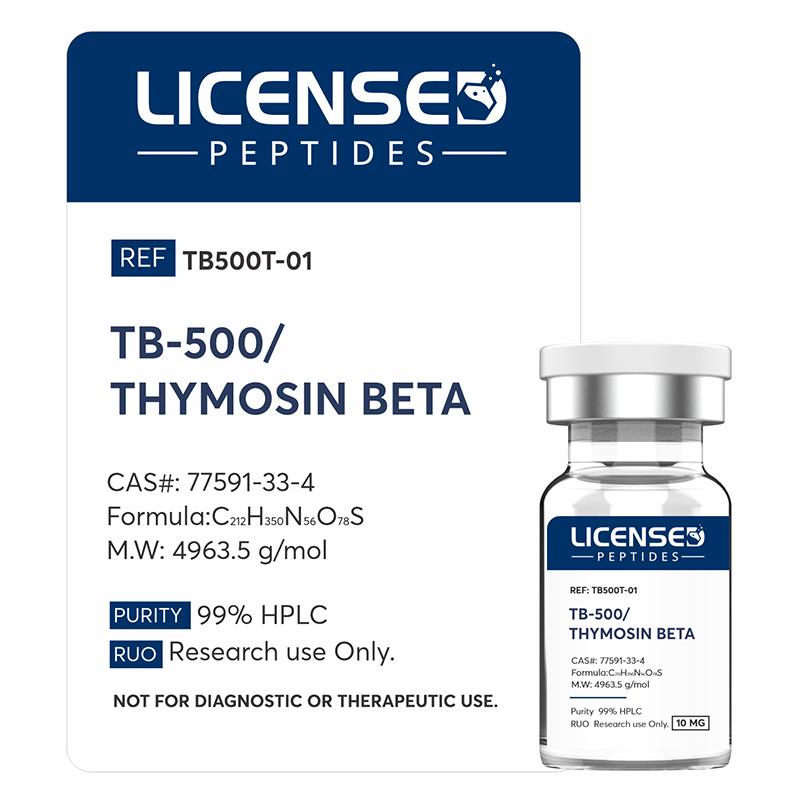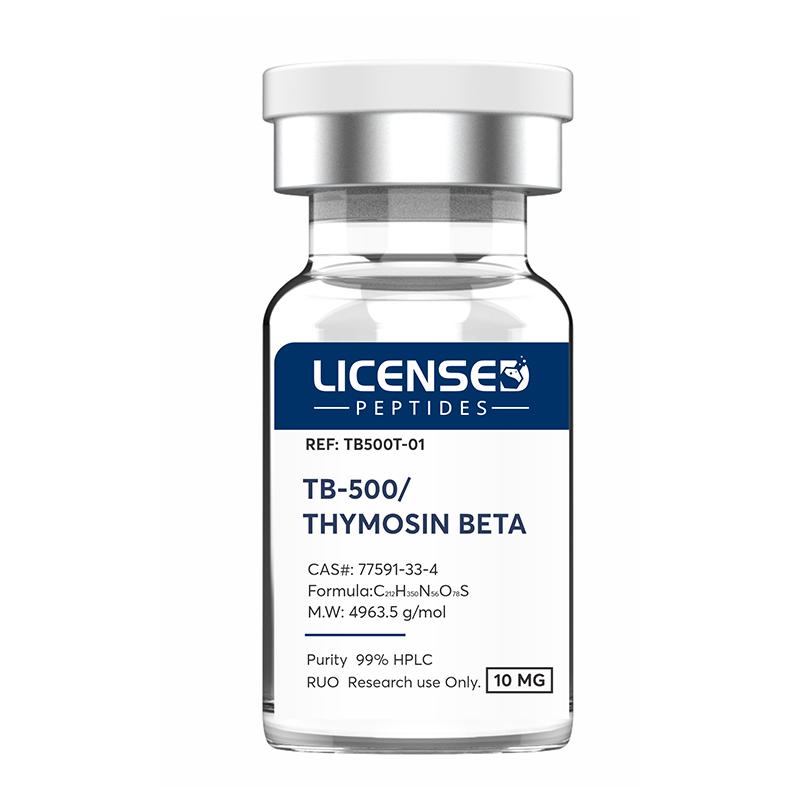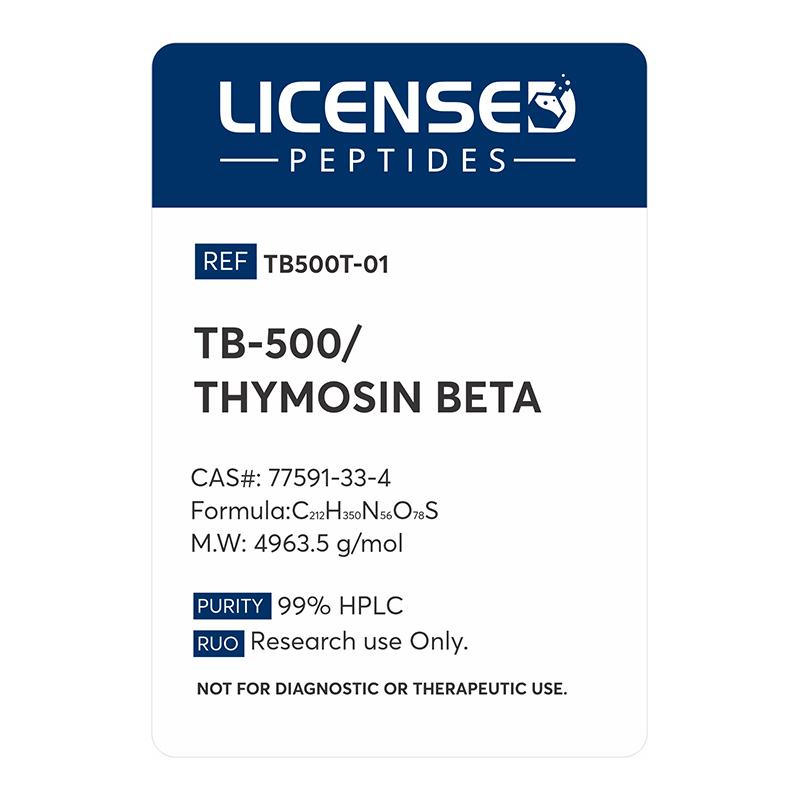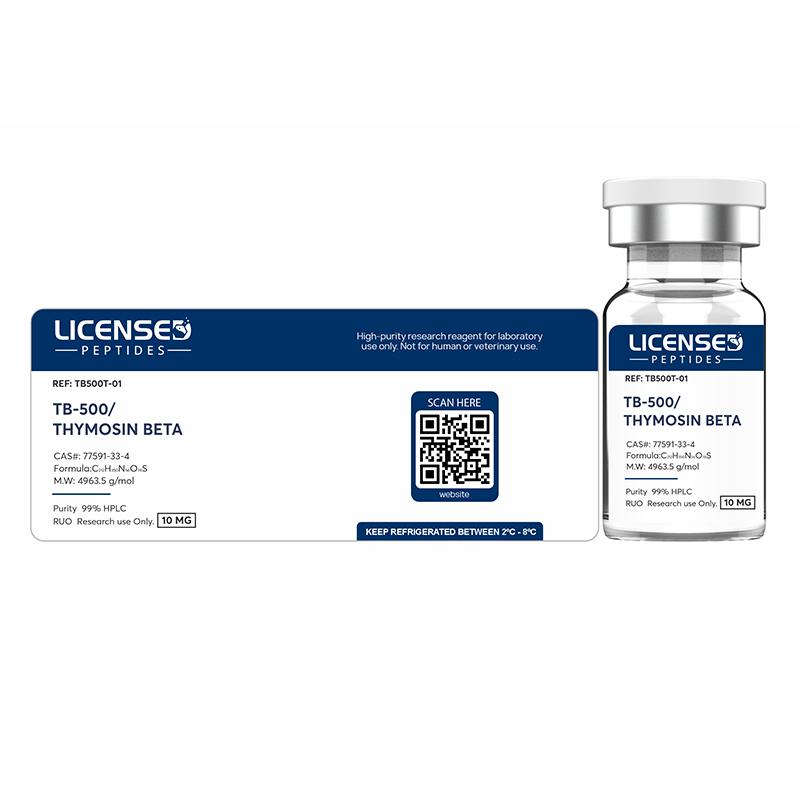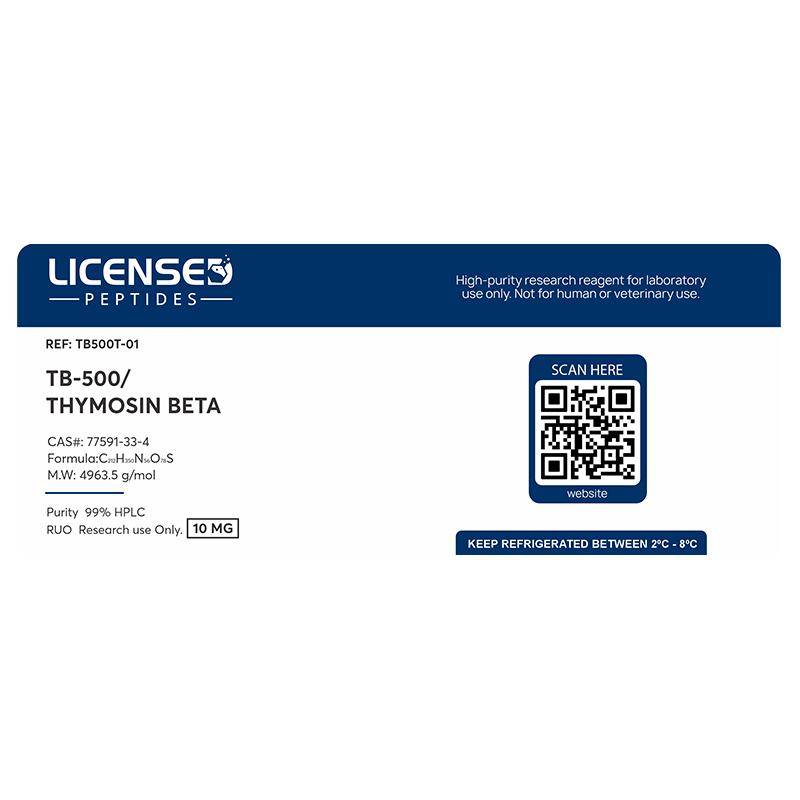TB-500 (Thymosin Beta-4) 10mg
$129.99
TB-500 (Thymosin Beta-4) is a synthetic peptide consisting of 43 amino acids. Preclinical studies in animal models indicate that Thymosin Beta-4 supports angiogenesis, modulates wound healing, reduces inflammation, and mitigates oxidative stress in both cardiac and neurological tissues. It plays a critical role in cytoprotection, tissue repair, regeneration, and structural remodeling following injury. Due to these properties, it has also attracted significant interest within the field of anti-aging research.
$129.99
$129.99
Peptide Capsules
Purchase Peptides
Purchase Blends
Overview
TB-500 is a synthetic peptide fragment of Thymosin Beta-4, a naturally occurring protein composed of 43 amino acids. Thymosin Beta-4 regulates actin, a key protein in cell structure and movement, making it essential for processes such as tissue repair, regeneration, and cellular migration.
Key Functions (from preclinical and experimental studies):
- Stimulates angiogenesis (growth of new blood vessels).
- Accelerates wound healing and tissue repair.
- Reduces inflammation and fibrosis.
- Protects against oxidative stress in cardiac and neural tissues.
- Supports regeneration and remodeling of damaged tissues.
TB-500 (Thymosin Beta) : Structure

Sequence: Ac-Ser-Asp-Lys-Pro-Asp-Met-Ala-Glu-Ile-Glu-Lys-Phe-Asp-Lys-Ser-Lys-Leu-Lys-Lys-Thr-Glu-Thr-Gln-Glu-Lys-Asn-Pro-Leu-Pro-Ser-Lys-Glu-Thr-Ile-Glu-Gln-Glu-Lys-Gln-Ala-Gly-Glu-Ser
Molecular Formula: C₂₁₂H₃₅₀N₅₆O₇₈S
Molar Mass: 4963.4408 Da
CAS Number: 77591-33-4
PubChem CID: 16132341
Synonyms: Thymosin Beta-4
TB-500 (Thymosin Beta) : Research
Wound Healing & Dermal Repair
- Accelerates re-epithelialization, collagen deposition, angiogenesis, and wound contraction in rat models. Topical or systemic application improved healing by 42–61%.
- Promotes dermal repair in diabetic and aged mice. The actin-binding motif (LKKTETQ) mimics full peptide activity.
- Accelerated dermal healing observed in animal models and preliminary improvements in human chronic wounds (pressure/stasis ulcers).
Cardiac Repair & Function
In mouse MI model, Tβ4 reduced cardiac rupture and mortality, decreased inflammation/apoptosis, and improved cardiac function and remodeling.
In a murine myocardial infarction (MI) model, Thymosin-β4 (Tβ4) administration (1.6 mg/kg/day) significantly improved survival and cardiac outcomes. Tβ4 reduced cardiac rupture, linked to decreased inflammatory cell infiltration, reduced myocyte apoptosis, lower ICAM-1 and p53 expression, and diminished gelatinolytic activity. Treatment also increased capillary density (CD31⁺ cells), enhanced cardiomyocyte survival, and reduced fibrosis. Over 5 weeks, Tβ4 improved left ventricular remodeling and cardiac function, with reduced dilation and collagen deposition.
Conclusion: Tβ4 exerts anti-inflammatory, pro-survival, and pro-angiogenic effects that prevent cardiac rupture and improve functional recovery after MI, highlighting its potential as a therapeutic agent in post-MI cardiac repair.
Referenced Citations
ALL ARTICLES AND PRODUCT INFORMATION PROVIDED ON THIS WEBSITE ARE FOR INFORMATIONAL AND EDUCATIONAL PURPOSES ONLY.
The products available on this website are intended solely for in-vitro research purposes (Latin: “in glass”), meaning they are used in experiments conducted outside a living organism. These products are not medicines or drugs, have not been evaluated or approved by the U.S. Food and Drug Administration (FDA), and are not intended to diagnose, treat, cure, or prevent any disease or medical condition. Any administration to humans or animals, whether by ingestion, injection, or other means, is strictly prohibited by law.
Test
Storage Instructions:
All of our products are manufactured using the Lyophilization (Freeze Drying) process, which ensures that our products remain 100% stable for shipping for up to 3-4 months.
Once the peptides are reconstituted (mixed with bacteriostatic water), they must be stored in the fridge to maintain stability. After reconstitution, the peptides will remain stable for up to 30 days.
Lyophilization is a unique dehydration process, also known as cryodesiccation, where the peptides are frozen and then subjected to low pressure. This causes the water in the peptide vial to sublimate directly from solid to gas, leaving behind a stable, crystalline white structure known as lyophilized peptide. The puffy white powder can be stored at room temperature until you’re ready to reconstitute it with bacteriostatic water.
Once peptides have been received, it is imperative that they are kept cold and away from light. If the peptides will be used immediately, or in the next several days, weeks or months, short-term refrigeration under 4C (39F) is generally acceptable. Lyophilized peptides are usually stable at room temperatures for several weeks or more, so if they will be utilized within weeks or months such storage is typically adequate.
However, for longer term storage (several months to years) it is more preferable to store peptides in a freezer at -80C (-112F). When storing peptides for months or even years, freezing is optimal in order to preserve the peptide’s stability.
For further information on proper storage techniques, click the link below:
